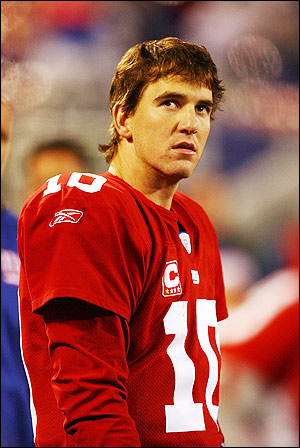Something to prove
"He is very resilient," Coughlin said of Manning on Wednesday during a news conference. "He is very focused on his job. He never bats an eye about saying what his responsibilities are, or whether he performed well or not. He always takes responsibility for that. He is an elected captain on the team. He is fully aware of that responsibility as well."
In their fourth season with the Giants, Coughlin and Manning are still looking for a defining moment on a team that has underachieved since advancing to the Super Bowl following the 2000 season. In the interim, Manning has become endless fodder for talk radio and the tabloids. When will he win a big game? Why isn't he more accurate? When will he step into the heat of a fourth quarter and make the moment his own?
Manning, whose brother is a Super Bowl champion and whose father is football royalty, lives in a fishbowl where every throw, tic and shrug of the shoulders is picked apart. It happened again after the loss to the Cowboys, a game in which he completed 23 of 34 passes for 236 yards and added a touchdown and two interceptions.
Surely, it wasn't Manning's fault that the Giants gave up four touchdown passes to Tony Romo, but then again, Manning failed to match Romo in production. Manning said he knows the criticism is there. It lives on the front and back pages of the newspaper and on the airwaves 24 hours a day.
"You just have to learn to accept it," he said. "It happens after a loss sometimes. You never know when it is going to happen or what is going to cause it or what strikes it up. But it is out there and you can't let it affect your personality or the way you are in the locker room or your approach. You have to stay the same and have a good attitude about everything and show everybody that it doesn't bother you and doesn't affect you and you are going to go out there and still practice hard and perform hard."
The Giants had won six straight games before falling apart in the second half against Dallas and re-opening all of the concerns about late-season collapses. Two years ago, facing a crucial road game in Seattle, the Giants fell to the Seahawks and, ultimately, were shut out in a home wild-card loss to the Carolina Panthers.
Last year, the Giants hosted the Chicago Bears in the midseason, outplayed them for much of the first half, and then imploded and lost the game. The Giants ended up squeaking into the playoffs and losing to the Philadelphia Eagles in another wild-card playoff.
Fairly or not, the bulk of the criticism has been focused on Manning, namely because of the position he plays. He faces it because he grew up in a house where football was a common language. He faces it because the Giants sacrificed three draft picks to trade up for him in the 2004 draft. He faces it because he is a Manning.
Coughlin said, "We know the environment that we are in here and, obviously, you would like it to be different, but it's not. That is basically the approach we have taken all along. There is no need to have any extensive eloquent conversations about it. It is what it is. And we need to move on."
That is the way of the NFL, always press on, always look forward, don't get tangled up in the past.
When the big games have presented themselves to the Giants in recent years, they have often failed to deliver. On Sunday, against a Detroit team that is undefeated at home, another opportunity awaits, maybe a defining moment for a quarterback in need of one.
"You are going to lose games -- that's part of football," Manning said. "It's just about learning from the mistakes, seeing what you are doing well and going into the next week with a good attitude that, if you win that one, you are back in a good spot and everything will be fine again."





